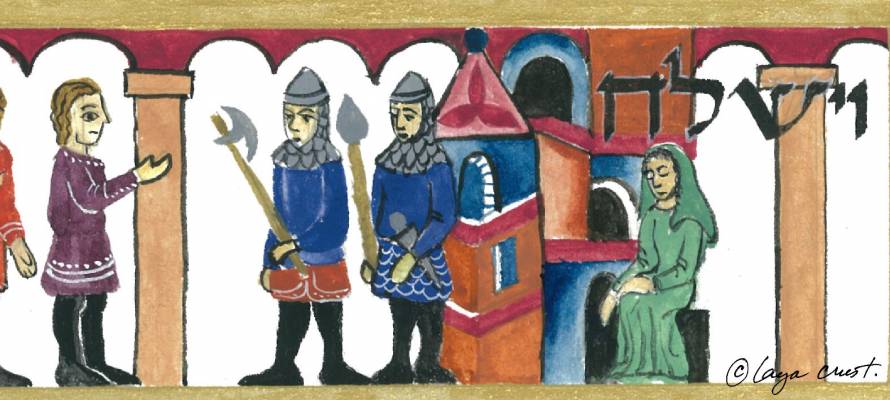Shimon and Levi had empathy for others, an integral characteristic of the Jewish people. What better educators and role models could we find?
By Rabbi Ari Enkin, Rabbinic Director, United with Israel
This week’s Torah portion is Vayishlach (Genesis 32:4-36:43), and in it we read about the rape of Dina, daughter of Jacob, by Shechem, the patriarch of the city by the same name. Shechem fell in love with Dina and desperately wanted to marry her. As such, he approached Jacob and his sons to inquire what he could do to get their blessing to marry Dina.
Jacob’s sons, furious at what had taken place, came up with a “plan” which they proposed to Shechem that would allow him to marry Dina with their blessings. The deal was that if Shechem, along with all males in the entire city of Shechem, would circumcise themselves, then Shechem would be allowed to marry Dina. Shechem accepted the deal, and he had everyone in the city circumcised.
On the third day, when everyone was weak and in the most pain from their circumcision, two of Dina’s brothers, Shimon and Levi, went into Shechem and killed everyone in the city, and they brought Dina back home.
I have three questions about this story. (If it was the Passover season, I may have had four!)
The Torah tells us that after Dina was raped, Jacob did not comment on what had taken place. He “remained silent” until his sons came back from their work on the field. Why did Jacob have to wait for his sons to return home from the field before dealing with his daughter’s kidnapping and rape? Why does he have to wait for his sons before “sounding the alarm?” Why does he delegate the response to this tragedy to his sons?
After Shimon and Levi avenge their sister’s rape by massacring the entire city, Jacob curses them! He blames them for endangering the family by committing such a drastic act! But why? Jacob must have been aware of what his sons were planning! He didn’t really think that Shimon and Levi had the entire city circumcised in order to conduct a mass conversion to Judaism! So, too, Jacob and his sons certainly had no intention of letting Shechem marry Dina! At the very least, Jacob must have known that Shimon and Levi were planning something radical.
Finally, after Jacob criticizes his sons for their actions, they respond, “Shall we allow our sister be treated like a harlot?” The narrative then ends. We are not told what Jacob’s reaction was to his sons’ response. What was it?
Dealing with Evil
The answer to the first question is that Jacob knew that he was dealing with evil people, and to do so often necessitates engaging in “unusual” tactics. Sometimes you have to be a little deceiving, just like they are. Therefore, Jacob, the man who represented honesty and truth, was unable to deal with Shechem. That’s why he left the job to Shimon and Levi. Although extreme measures were called for, Jacob just couldn’t bring himself to be the one to carry them out.
Regarding the second question, it is explained that Jacob knew that something was up, but he didn’t know that murder was on the agenda. He thought that the plan was to convince the people of Shechem to circumcise themselves, and then when they were weak, to conduct a rescue operation to get Dina out of there. Jacob was not aware that the plan included wiping out the people of Shechem in the process.
The answer to the third question is what I would like to focus on. Our sages teach us that Jacob’s response – when Shimon and Levi rhetorically asked him, “Shall we allow our sister be treated like a harlot?” – was…to appoint them the schoolteachers of the Jewish people! That was Jacob’s response for killing the entire city of Shechem!
Where’s the connection?
It is explained that Jacob appointed Shimon and Levi as the educators of the Jewish people as a result of how much they cared for the honor of their sister. All the other sons/brothers knew that Dina had been raped. But where were they? We don’t hear about their concern or willingness to do anything about it! They’re nowhere to be found! Only Shimon and Levi rolled up their sleeves to do something about what had happened to their sister. Only they showed care and solidarity with their sister!
Shimon and Levi were people who had empathy for others, not only for their sister. This concern for another person is an integral characteristic of the Jewish people. Who else could serve as role models and educators better than those who live the values that they teach? Who else could take on the life of a classroom, demanding parents, and often uncooperative students? Only a person who really believes – and lives – what he teaches. That’s the reason Jacob chose them for that role.
For more insights on the weekly Torah portion by Rabbi Ari Enkin, click on the links below.
https://unitedwithisrael.org/vayishlach-being-happy-with-what-we-have/
https://unitedwithisrael.org/living-torah-the-eternal-wrestling-match/
https://unitedwithisrael.org/fighting-the-esaus-of-yesterday-and-today/
